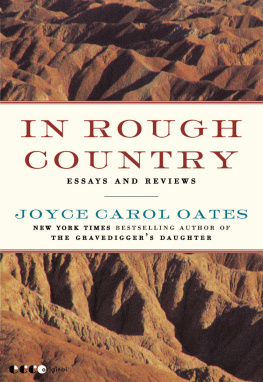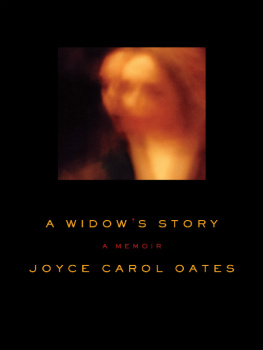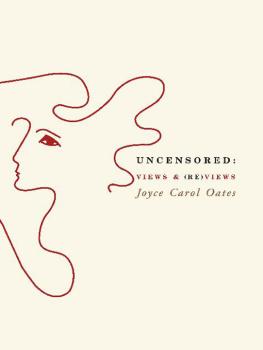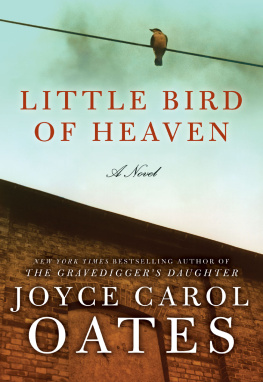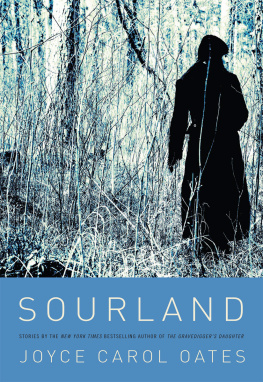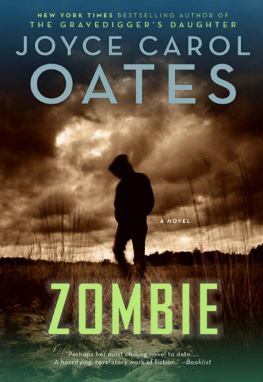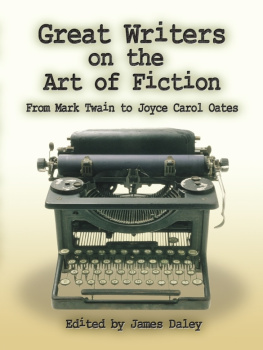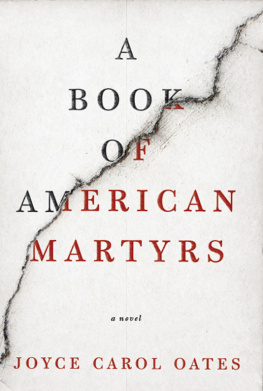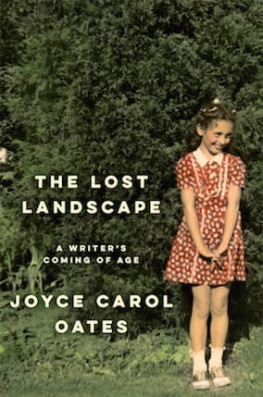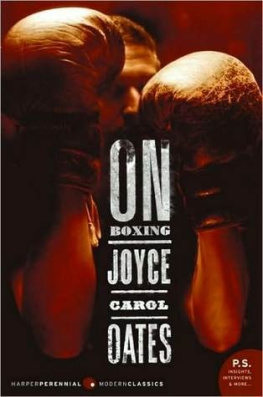In Rough Country
The rough country of my title has a double meaning: it refers to both the treacherous geographical/psychological terrains of the writers who are my subjectsFlannery OConnor, Shirley Jackson, Cormac McCarthy, Annie Proulx, Margaret Atwood among othersand also the emotional terrain of my life following the unexpected death of my husband Raymond Smith in February 2008 after forty-eight years of marriage.
As literature is a traditional solace to the bereft, so writing about literature can be a solace to the bereft as it was to me during the days, weeks, and months when the effort of writing fiction often seemed beyond me, as if belonging to another lifetime when Id been younger, more resilient and reckless. Overnight everything seemed to change for me, and inside methe death of a loved one is a universal experience yet, to the bereaved, it is singular as a mountain thundering downhill in an avalanche that swallows you up utterly, batters your brain and fills your mouth with rubble. I could compose short storiesslowly and painstakinglywith perhaps one-tenth of the efficiency Id formerly taken for grantedbizarre and surreal stories about loss, grief, survivingbut I have not been able to imagine anything so ambitious as a novel, even a short novel. Like a person whose vision has become blurred following a blow to the head, I cant seem to see beyond the relatively brief span of the short story.
Reading and taking notes, especially late at night when I cant sleep, has been the comfort for me that saying the rosary or reading The Book of Common Prayer might be for another. Immersing myself in the imaginations of other writers, constructing a line of argument which is the structure of a literary essayin contrast to the less calibrated and predictable swerves and leaps of fictionhas been a lifeline. Reading, which had always been, in my former life, my reward for a full day of writing, became, in my new, uncharted life as a widow, an end in itself of almost mystical significance. These fragments I have shored against my ruinsthis line from T. S. Eliots The Waste Land echoed obsessively in my thoughts. I came to feel that I was making my way word by word, sentence by sentence, across something like a narrow swaying footbridge above an abyssthis footbridge wasnt my construction but comprised of others work, for which I was infinitely grateful. Working into the early hours of the morningas Id never done when I was married and our lives adhered to a conventional and commonplace domestic routinereading in bed still partly dressed amid a nest of pillows, my mothers knitted quilt, papers, books, and bound galleys, and when I was very lucky one or another of our two catswho were slow to forgive me for the abrupt and mysterious disappearance of the individual who by custom fed them their breakfast each morning as well as talked to them through the day as requiredbecame the new center of my life, an oasis of quiet in contrast to the nightmare cacophony of daytime: the phone ringing, ceaseless e-mails, death-duties to be executed ad infinitum . Days were filled with other people and none of them my missing husband: people in whose eyes I saw sympathy, pity, uneasiness, concern. By night, I was an avid reader and writer; by day, a widow.
What a widow is , is defined by an absence.
What a widow is not , is a whole/unmaimed individual.
Working late into the night was a melancholy sort of pleasure but when I did sleep, in the way of the insomniacs sudden stuporous coma-like sleep like a prcis of death, it was very difficult to wake upto wake fullyin the morningwhatever morning was. Where getting out of bed had once been effortless, unthinking, now the very concept getting out of bed acquired an almost supernatural significance: fraught with danger, terror, dread. What is more awful than waking, getting up ?when you want so very badly to sleep; when your brain aches for the extinction of all thought, especially the awareness of time. Sleep becomes if not happiness, a reminder of happiness; a respite from the duties of daylight that involve memory, thinking, making decisions and actions . There were mornings in the late winter and early spring of last year when it seemed to me that the very air of my bedroom had turned viscous and heavy; that gravity exerted some sort of new, palpable pressure, as if I were lying on the bottom of the ocean. My brain was a kind of cotton batting which deep-ocean-thoughts of menace could make their way only slowly and what a risk, to disturb this paralysis! Nothing is so exhausting and daunting to the insomniac as getting out of bed and so my remedy was to forestall this by propping myself up against pillows and returning to whatever Id been doing when Id finally turned out the light and tried to sleep a few hours before. In this way though I had committed myself to opening my eyes yet I need not yet complete the ordeal of getting out of bed . I recalled that Edith Wharton famously wrote her novels in long-hand in a similar posture in her enormous canopied bed, tossing sheets of paper onto the floor for a maid to gather up. I had no maid, nor did I toss my notes onto the floor, but I quite understood Whartons instinct in this case to forestall contending with whateverin Whartons case house-guests, social lifeawaits beyond ones bed.
During these months, and well into this new year of 2009, Robert Silvers of the New York Review of Books has been my cherished friend. Like his late co-editor Barbara Epstein, my beloved editor for more than twenty years at NYR , Bob is the most exacting of editors as he is a warmly encouraging and thoughtful reader. There is something thrillingif also dauntingabout undertaking to review a book one hasnt yet read and assessed; if your inclination is, like my own, to wish not to publicly criticize any work of art, in acknowledgment of the difficulty of creating anything whether meritorious or otherwise, its an endeavor in which the reviewer risks exposure, as in a fun house mirror. The most painful of the essays included here is Boxing: History, Art, Culture for this was undertaken in February 2008 before my husband was stricken with pneumonia and hospitalized at the Princeton Medical Center; during Rays week in the hospital I worked on the essay in frantic bursts in the interstices of driving to the hospital, teaching my classes at Princeton University, and dealing with household duties; at night, after visiting hours at the hospital, I researched and worked on the essay until 2 A.M . or soI was proud of myself in the small ridiculous ways in which we are proud of ourselves at such desperate times; my husband, who did not usually read my fiction, was looking forward to reading this essay, or so he said. No one could know the effort that went into this single review that would appear in a May 2008 issue of NYR out of all proportion to its length and significance as a text; no one could guess that there is a break in the essay between the second section and the section that begins with the words From the bare-knuckle era of John L. Sullivanthe pages before were written by a woman with a husband, the pages following were written by a woman who had lost her husband. It was Nietzsche who said Between one and none there gapesan infinity.
After my husbands sudden death, of what was called a hospital infection, only a few hours after wed been discussing his discharge within a few days, I could return to this essay only sporadically, with a residual sort of excitement, as there might be observed, in the waning light of the iris of the eye of a decapitated beast, some residual alertness to stimuli, but it was not revised and completed for some time. Yet in the immediate aftermath of my husbands death, in a kind of vigil that night, when several friends of ours came to stay with me, stunned as I was, and tenderly solicitous, it happened thatfor something to say of an abstract and impersonal nature, I supposeI spoke about the essay I was writing, the ambitious scholarly book I was reviewing, and of the very long history of boxinghow what seems to us recent may in fact have its roots in antiquity, in almost pre-history. How minuscule, how finite, how fleeting the individual . Whatever else I managed to say that night, I dont remember, and I have little memory of what my friends said, but this profound thought remains. There is pathos here, but perhaps a kind of beauty as well. Ideas, literature, art remain after much else falters and falls away. It is not a permanent victory by any means, but it is a victory of a kind and it is a victory we all share.

